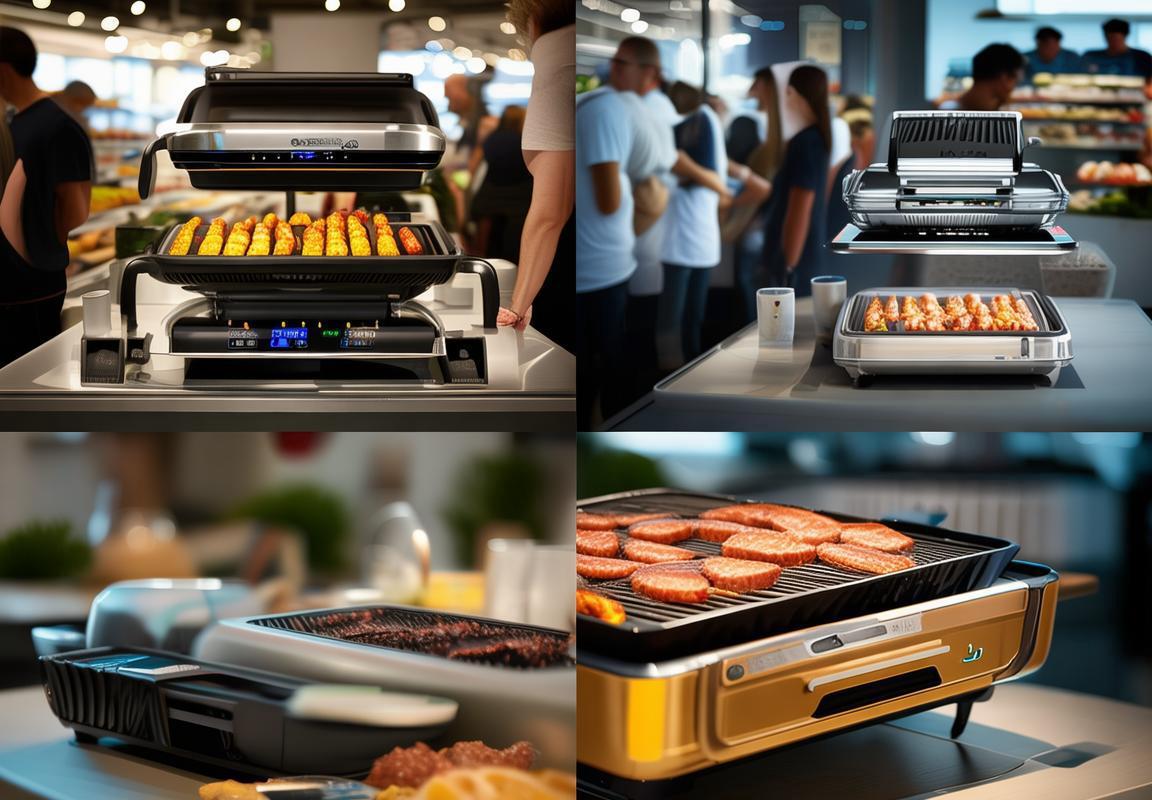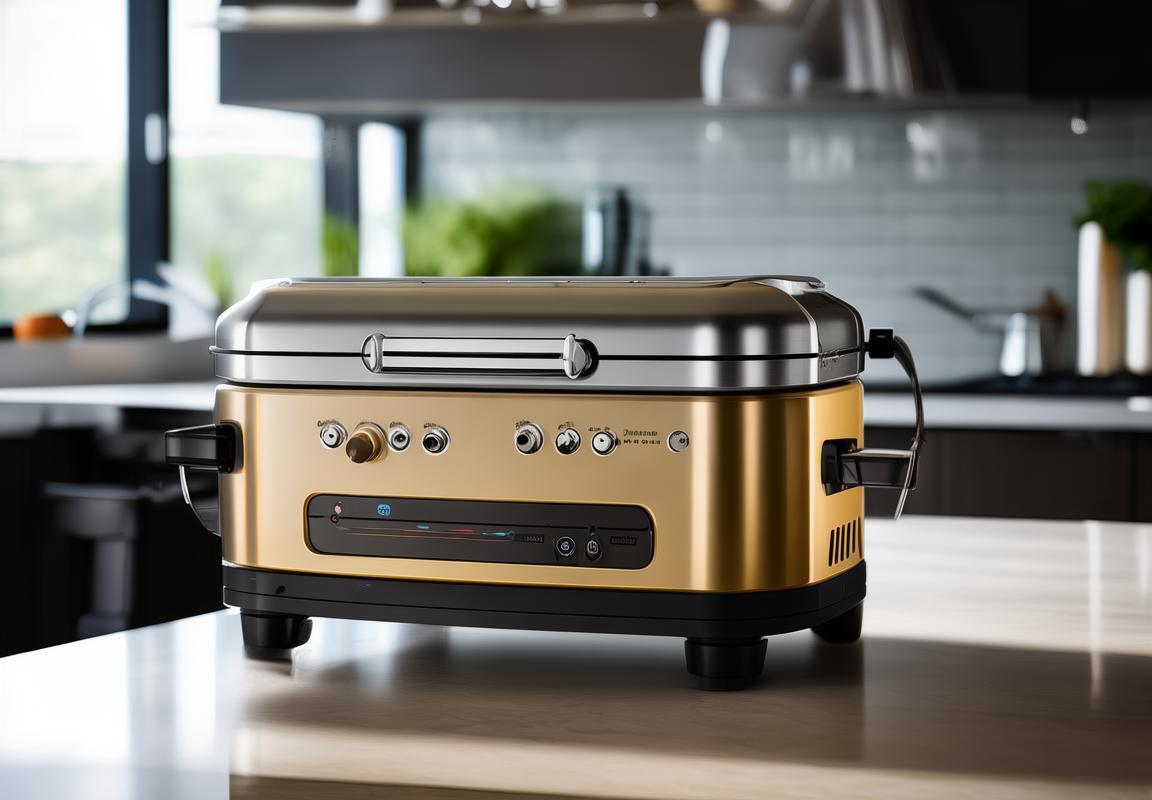As the demand for safe and sustainable kitchen appliances grows, the RoHS compliant electric grill has emerged as a standout product in both the European and American markets. This shift is not just a trend but a significant leap towards eco-conscious consumerism and health-conscious living. The RoHS compliant electric grill not only offers the convenience and functionality that homeowners seek but also does so without compromising on environmental standards or safety regulations. This article delves into the key features that make these grills a favorite among consumers, the benefits they bring to the table, and the competitive landscape that shapes their market presence. We also explore the future predictions and outlook for the electric grill industry, highlighting the potential growth and challenges ahead.
I.TheRoHSRegulation:WhatItMeansforElectricGrills
The RoHS Regulation: A Cornerstone for Electric Grill Safety and Sustainability
The RoHS (Restriction of Hazardous Substances) regulation is a European Union directive that has had a profound impact on the manufacturing and importation of electrical and electronic equipment. For electric grills, this regulation is not just a legal requirement; it’s a benchmark for safety, environmental responsibility, and consumer trust. Let’s delve into what the RoHS regulation entails and how it shapes the electric grill market.
At its core, the RoHS directive restricts the use of certain hazardous substances in the manufacture of electrical and electronic equipment. These substances include lead, mercury, cadmium, hexavalent chromium, polybrominated biphenyls (PBBs), and polybrominated diphenyl ethers (PBDEs). The rationale behind this restriction is to minimize the environmental impact of electronic waste and to protect human health by reducing exposure to these harmful chemicals.
For electric grills, which are a popular choice for outdoor cooking enthusiasts, the RoHS regulation demands that the materials used in their construction must be free from these restricted substances. This means that the metals, plastics, and other components that make up an electric grill must be carefully selected and tested to ensure compliance.
One of the key benefits of the RoHS regulation for electric grills is the enhanced safety it offers to consumers. By eliminating or significantly reducing the presence of hazardous substances, electric grills become less likely to pose health risks, such as causing allergic reactions or contributing to respiratory issues. This peace of mind is invaluable, especially for families with young children or individuals with sensitivities to certain chemicals.
Moreover, the RoHS regulation has environmental implications. By restricting the use of harmful substances, the directive helps to reduce the amount of electronic waste that ends up in landfills. This is particularly important for electric grills, which are often replaced after a few years due to technological advancements or wear and tear. With fewer hazardous substances in the grills, recycling and disposal become more sustainable processes.
The RoHS certification process for electric grills is rigorous. Manufacturers must undergo testing to ensure that their products meet the stringent standards set by the regulation. This involves analyzing the components of the grill to confirm that they do not contain prohibited levels of the restricted substances. The certification process can be time-consuming and costly, but it is a testament to the manufacturer’s commitment to quality and compliance.
For consumers, the RoHS compliant label on an electric grill is a clear sign of quality and safety. It indicates that the grill has been manufactured with care and adheres to the highest environmental and health standards. This can be a deciding factor for many consumers who are looking for a reliable and sustainable cooking solution for their homes.
In the European and American markets, the demand for RoHS compliant electric grills has been steadily growing. Consumers are becoming more environmentally conscious and health-aware, leading them to seek out products that align with their values. This trend is reflected in the market, where more manufacturers are investing in research and development to produce grills that meet the RoHS standards.
However, the RoHS regulation also presents challenges for manufacturers. The costs associated with sourcing compliant materials and conducting the necessary testing can be significant. Additionally, the design and production processes may need to be adjusted to accommodate the requirements of the RoHS directive. Despite these challenges, the benefits of compliance often outweigh the costs, as it can open up new markets and enhance the brand reputation.
In conclusion, the RoHS regulation is a critical factor in the electric grill industry. It ensures that consumers have access to safe and environmentally friendly products. As the market continues to evolve, we can expect to see more innovation and a greater emphasis on sustainability. The RoHS compliant electric grill is not just a product; it’s a symbol of the industry’s commitment to responsible manufacturing and consumer protection.

II.MarketTrendsinEuropeandtheUnitedStates
In Europe, the electric grill market has seen a significant shift in consumer preferences over the years. With a growing emphasis on health and wellness, there’s been a surge in demand for kitchen appliances that offer a healthier cooking alternative to traditional grilling methods. This trend has been particularly pronounced in countries like Germany, France, and the UK, where consumers are increasingly opting for electric grills that are not only convenient but also compliant with stringent safety standards.
The American market, on the other hand, has been slower to adopt electric grills, but there’s a steady increase in interest, especially among health-conscious consumers and those living in urban areas where outdoor cooking space is limited. The U.S. market has seen a rise in the popularity of compact and portable electric grills, which cater to the busy lifestyle and the desire for quick, easy meals.
In Europe, the electric grill market is influenced by several factors. The first is the cultural preference for outdoor cooking, which has led to a demand for high-quality electric grills that can mimic the experience of traditional charcoal or gas grilling. Brands like Tefal, Breville, and Gaggenau have capitalized on this by offering a range of electric grills that promise a similar flavor profile and cooking experience.
The rise of health and sustainability initiatives has also played a crucial role in the European market. Many consumers are looking for cooking methods that reduce smoke and emissions, which is where electric grills shine. These appliances are often seen as a more eco-friendly option, especially when compared to traditional grilling methods that can release harmful pollutants into the air.
In the United States, the market for electric grills is being driven by different dynamics. The convenience factor is a major draw, as many Americans lead fast-paced lives and seek appliances that can help them prepare meals quickly without compromising on quality. Additionally, the trend towards healthier eating habits has led to a greater interest in electric grills, which can be used to cook a variety of foods with less oil and fat.
The American market also benefits from a strong focus on innovation. Brands like George Foreman and Hamilton Beach have introduced a range of electric grills with advanced features such as adjustable heat settings, non-stick surfaces, and removable cooking plates, making them versatile and easy to clean. This focus on innovation has helped to differentiate electric grills from other kitchen appliances and has contributed to their growing popularity.
Another interesting trend in both Europe and the United States is the rise of smart kitchen appliances. Electric grills that can be controlled via smartphone apps are becoming more common, offering consumers the ability to preheat their grills, monitor cooking temperatures, and even set timers remotely. This level of connectivity is appealing to tech-savvy consumers who are looking for ways to integrate their kitchen appliances with their digital lifestyles.
Despite these positive trends, both markets face challenges. In Europe, the cost of electric grills can be a barrier for some consumers, especially when compared to traditional grilling methods. Additionally, the perception that electric grills do not produce the same smoky flavor as charcoal or gas grills can be a deterrent for those who are die-hard grill enthusiasts.
In the United States, the market is also affected by the high cost of living in certain areas, which can make the investment in an electric grill seem less justifiable. Moreover, the perception that electric grills are less durable or less efficient than their traditional counterparts can limit their appeal.
Overall, the electric grill market in both Europe and the United States is evolving, with a focus on health, convenience, and innovation. As consumer awareness of the benefits of electric grilling continues to grow, it’s likely that we’ll see further market expansion and increased adoption of these appliances in the coming years.

III.KeyFeaturesofRoHSCompliantElectricGrills
In the evolving landscape of kitchen appliances, the demand for RoHS compliant electric grills has surged. These grills, designed with environmental and health considerations in mind, boast several key features that set them apart in the market.
Grills that adhere to the RoHS (Restriction of Hazardous Substances) directive are crafted with a focus on safety and sustainability. They are free from certain hazardous materials like lead, mercury, cadmium, hexavalent chromium, polybrominated biphenyls (PBBs), and polybrominated diphenyl ethers (PBDEs). This not only ensures that the grill itself is safe for use but also that it won’t contribute to environmental pollution over its lifespan.
Energy efficiency is a cornerstone feature of RoHS compliant electric grills. These grills are designed to minimize energy consumption without compromising on performance. Advanced heating elements and smart control systems allow for precise temperature regulation, ensuring that food is cooked to perfection while reducing electricity bills.
Durability is another crucial aspect. The materials used in these grills are not only safe but also robust, capable of withstanding the rigors of frequent use. High-quality stainless steel construction is common, providing a long-lasting and easy-to-clean surface that can withstand high temperatures and resist corrosion.
The design of RoHS compliant electric grills often includes user-friendly features that enhance the cooking experience. Digital temperature controls allow for precise and consistent heat management, while non-stick surfaces make for effortless food release and easy cleaning. Some models even come with adjustable cooking zones, enabling users to cook different types of food simultaneously at varying temperatures.
Safety features are paramount in these grills. Overheat protection mechanisms are standard, preventing accidents and damage to the appliance. Additionally, many models are equipped with cool-touch handles and surfaces, reducing the risk of burns. Some grills also feature safety interlocks that prevent the grill from operating unless the lid is properly closed.
Innovation in cooking technology is also a hallmark of RoHS compliant electric grills. Features like programmable timers, integrated thermometers, and LED lighting have become increasingly common, offering users a range of functionalities that were once only available in high-end, gas-powered grills.
The integration of smart technology is another trend. Many modern electric grills are compatible with smartphones and tablets, allowing users to control the grill remotely. This connectivity not only adds convenience but also enables users to monitor cooking progress and make adjustments from anywhere.
The design of RoHS compliant electric grills often reflects a commitment to aesthetics. Sleek, modern designs with clean lines and minimalistic aesthetics are popular, fitting well into contemporary kitchen decor. The inclusion of features like casters for easy mobility and storage solutions like foldable legs or retractable power cords add practicality to the aesthetic appeal.
Lastly, the eco-friendly aspect of these grills is not just about the materials used but also about the grilling experience itself. These grills often produce less smoke and odors compared to traditional charcoal or gas grills, making them a more pleasant choice for indoor or apartment living.
In conclusion, the key features of RoHS compliant electric grills encompass safety, sustainability, efficiency, user-friendliness, and innovation. These features make them a compelling choice for consumers looking for a reliable, eco-conscious, and versatile cooking solution.

IV.ConsumerBenefitsofRoHSCompliantGrills
RoHS compliant electric grills are not just a product, but a symbol of commitment to safety and environmental responsibility. Here’s how they benefit consumers:
The health and safety of consumers are paramount, and RoHS compliant electric grills offer peace of mind with their adherence to strict standards. These grills are free from harmful substances like lead, cadmium, mercury, hexavalent chromium, and polybrominated biphenyls (PBBs), which can pose serious health risks if ingested or inhaled. Knowing that your cooking appliance is safe to use reduces the risk of exposure to these toxic materials, making it a healthier choice for families.
Environmental consciousness is on the rise, and RoHS compliant grills align with this trend. By using materials that are not harmful to the environment, these grills contribute to a greener planet. The reduction of hazardous substances in the manufacturing process means less waste and pollution. For consumers who are environmentally conscious, this commitment to sustainability is a significant draw.
Cost-effectiveness is often a concern for consumers, and RoHS compliant electric grills can offer savings over time. Since these grills are built with durable materials and components, they tend to have a longer lifespan compared to non-compliant models. This longevity means fewer replacements and lower maintenance costs, making them a smart investment.
Consumers who prioritize convenience will appreciate the features of RoHS compliant electric grills. With their efficient design and energy-saving capabilities, these grills can help reduce utility bills. Their ease of use, from simple assembly to one-touch controls, makes cooking a breeze, especially for those with busy lifestyles or limited cooking skills.
For tech-savvy consumers, the integration of smart features in RoHS compliant electric grills is a game-changer. These grills often come with digital temperature control, timers, and even Wi-Fi connectivity, allowing users to monitor and control their cooking from anywhere. This level of technology not only enhances the cooking experience but also ensures that the food is cooked to perfection, every time.
Safety features are often overlooked, but RoHS compliant electric grills come with a range of safety mechanisms. From non-slip bases to cool-to-the-touch handles, these grills are designed to prevent accidents and burns. Features like auto shut-off when the grill is left unattended or the temperature exceeds safe limits are standard, offering an extra layer of security for the consumer.
For those with allergies or sensitivities, RoHS compliant grills can be a lifesaver. The absence of certain flame retardants and phthalates means these grills emit fewer allergens, making them a better option for individuals with asthma or chemical sensitivities.
In terms of aesthetics, RoHS compliant electric grills are often designed with sleek, modern aesthetics in mind. They can enhance the look of any kitchen, from traditional to contemporary styles, without compromising on functionality or safety.
Lastly, the reputation of brands that produce RoHS compliant electric grills speaks volumes. Consumers who purchase these grills are investing in a brand that stands for quality and innovation. This trust and reliability extend to customer service, with many brands offering support and warranty options to ensure customer satisfaction.
Overall, the benefits of RoHS compliant electric grills are multifaceted, offering consumers a safer, healthier, and more convenient cooking experience while supporting environmental sustainability and responsible manufacturing practices.

V.TheCompetitiveLandscape
In the realm of electric grills, the competitive landscape is a dynamic and ever-evolving arena where innovation meets consumer demand. Brands are constantly striving to outdo each other with features, design, and sustainability. Here’s a closer look at the key players and trends shaping this competitive market.
Brands like Char-Broil, Weber, and Broil King have long been household names in the grill industry. They’ve established themselves as leaders by offering a range of RoHS compliant electric grills that cater to different budgets and preferences. Char-Broil, for instance, has a strong presence in the European market with models like the Char-Broil Signature Series, known for their durability and innovative features.
On the other side of the Atlantic, Weber has a cult following with its Genesis II E-310, a sleek and powerful electric grill that’s a favorite among barbecue enthusiasts. The brand’s commitment to quality and performance has kept it at the forefront of the American market.
Innovation isn’t just about brand loyalty; it’s about pushing the boundaries of what’s possible. Companies like Cuisinart and George Foreman have embraced technology to create electric grills that not only cook food but also enhance the grilling experience. Cuisinart’s electric grills often come with built-in thermometers and timers, making them a favorite among those who value convenience.
The George Foreman brand, known for its flat grills, has ventured into the electric grill market with models that promise to lock in flavors and reduce the need for oil, appealing to health-conscious consumers. Their focus on health and ease of use has helped them carve out a niche in the competitive landscape.
Sustainability has become a significant factor in the competitive landscape, especially with the introduction of RoHS compliant electric grills. Brands like Breville and Hamilton Beach have stepped up to offer eco-friendly options that meet the stringent European regulations. These brands are not just marketing their grills as green; they’re integrating sustainable practices into their design and manufacturing processes.
The rise of smart technology has also influenced the competitive landscape. Electric grills with Wi-Fi connectivity and smartphone apps are becoming more common, allowing users to control their grills remotely. Brands like Napoleon offer the Lancer series, which is equipped with smart technology, making grilling more accessible and convenient.
In the American market, the competitive landscape is marked by a blend of traditional and modern brands. Traeger, known for its pellet grills, has expanded its line to include electric models that are RoHS compliant. Their brand recognition and reputation for quality have helped them gain a significant market share.
As the market continues to grow, so does the competition. New entrants are emerging with unique selling propositions, such as eco-friendly materials, advanced cooking technologies, and user-friendly designs. These new players are shaking things up and challenging the status quo.
The competitive landscape of electric grills is also influenced by distribution channels. Online sales have become a major player, with marketplaces like Amazon offering a vast array of options. brick-and-mortar retailers, however, remain crucial for those who prefer to see and touch products before making a purchase.
In conclusion, the competitive landscape of RoHS compliant electric grills is marked by a diverse array of brands, each vying for a piece of the pie. From innovation and sustainability to smart technology and health-conscious features, consumers have more choices than ever before. As the market continues to evolve, it’s clear that the only constant is change, and brands must adapt to stay ahead.

VI.PredictionsandFutureOutlook
The electric grill market is on the rise, and with it comes a surge of innovative products that cater to consumer demands for healthier cooking methods and environmentally friendly appliances. Here’s a glimpse into the future of the electric grill industry:
Innovative Technology Integration: As the market matures, we can expect to see a blend of cutting-edge technology with electric grills. Smart grills that offer connectivity to smartphones and other devices, allowing for remote control and monitoring, are becoming more prevalent. These technologies not only enhance user experience but also offer features like automatic temperature control and cooking time management.
Sustainability Focus: With growing environmental concerns, manufacturers are increasingly focusing on sustainability. RoHS compliant electric grills are not just about meeting regulatory standards; they represent a broader commitment to reducing the environmental impact of kitchen appliances. Expect to see a rise in grills made from recycled materials, and those designed for longevity to minimize waste over time.
Market Segmentation: The electric grill market is diversifying, targeting different segments of consumers. From budget-friendly models to premium, high-end grills with advanced features, there’s a wide range of options available. This segmentation allows for better market penetration and caters to the specific needs and preferences of various consumer groups.
Global Expansion: As demand for electric grills continues to grow, so does the global market. Brands are looking beyond their domestic markets and expanding into new regions. This international outreach is fueled by the increasing popularity of electric cooking appliances in countries where space is limited or where there’s a shift towards healthier lifestyles.
Health and Wellness Trends: The health and wellness movement is driving the electric grill market. Consumers are seeking cooking methods that reduce oil usage and offer healthier alternatives to traditional grilling on open flames. As awareness of the health benefits of electric grills spreads, the market is poised to grow even further.
Regulatory Compliance: The RoHS directive continues to influence the market, ensuring that manufacturers adhere to strict standards regarding the use of hazardous substances in electrical and electronic equipment. This not only protects consumers but also encourages manufacturers to invest in research and development to create more sustainable and compliant products.
E-commerce Growth: The rise of online shopping has significantly impacted the electric grill market. More consumers are turning to e-commerce platforms to purchase their appliances, which has led to increased competition and a broader product range. Online reviews and ratings play a crucial role in consumer decision-making, making it essential for brands to maintain high-quality standards and customer satisfaction.
Customization and Personalization: Consumers are looking for more personalized experiences, and the electric grill market is responding with customizable features. From adjustable cooking temperatures to interchangeable cooking plates, the industry is evolving to offer products that can be tailored to individual preferences and dietary needs.
Energy Efficiency: With rising energy costs and a growing awareness of climate change, energy efficiency is a key concern. Electric grills that are designed to use less energy and provide more efficient cooking times will likely become more popular. This includes advancements in insulation and heating elements that can reduce energy consumption without compromising on performance.
The electric grill market is a dynamic and rapidly evolving sector, with numerous opportunities and challenges on the horizon. By focusing on innovation, sustainability, and meeting consumer demands, the industry is well-positioned for continued growth and success.

VII.Conclusion
In the ever-evolving landscape of kitchen appliances, the rise of RoHS compliant electric grills has sparked a wave of innovation and consumer interest. These grills, designed to meet the strict regulations of the Restriction of Hazardous Substances directive, offer a host of benefits that resonate with environmentally conscious and health-aware consumers. Here’s a closer look at the competitive landscape and what the future might hold for this burgeoning market.
Grills that adhere to RoHS standards are not just a trend; they represent a shift towards sustainability and safety. As the market continues to grow, we see a mix of established brands and emerging players vying for a share of this green-conscious consumer base. The competition is fierce, with each company pushing the boundaries of design, functionality, and environmental responsibility.
Established manufacturers have leveraged their existing expertise to adapt their products to RoHS compliance. For instance, companies like KitchenAid and Breville have introduced electric grills that boast advanced features while adhering to the stringent RoHS guidelines. Their reputation for quality and innovation has given them a leg up in the market.
On the other side of the spectrum, we find new entrants bringing fresh perspectives and innovative technologies. Startups and niche brands are experimenting with materials and designs that not only meet RoHS standards but also push the boundaries of what an electric grill can be. Their willingness to take risks and invest in research and development is reshaping the competitive landscape.
The market is also witnessing a trend towards collaboration and partnerships. Brands are joining forces to share resources, technology, and knowledge, which can lead to more efficient production processes and the development of new, cutting-edge products. This collaboration can be seen in joint ventures between appliance giants and tech startups, aiming to create smart grills that integrate seamlessly with smart home systems.
As the competition intensifies, consumers are the ultimate winners. They are presented with a wider range of choices, each offering unique features and benefits. From compact countertop grills to large outdoor models, the variety is vast, catering to different cooking styles and preferences.
Looking ahead, the future of RoHS compliant electric grills seems promising. The market is expected to grow significantly as more consumers become aware of the health and environmental benefits of these products. Here are some key predictions and future outlooks:
-
Technological Advancements: We can anticipate further technological advancements in the realm of electric grills. Improved heating elements, better temperature control systems, and innovative cooking surfaces are likely to be developed, enhancing the overall cooking experience.
-
Smart Integration: The integration of smart technology is poised to become a standard feature in electric grills. Grills that can be controlled via smartphone apps, offering remote monitoring and programmable settings, will likely become more prevalent.
-
Sustainability Focus: As environmental concerns continue to grow, the market will likely see a greater emphasis on sustainability. This could mean the use of recycled materials, energy-efficient designs, and a focus on reducing the carbon footprint of production and transportation.
-
Health and Safety: With health being a top priority for many consumers, we can expect to see electric grills that offer additional safety features and health benefits, such as non-toxic coatings and anti-bacterial surfaces.
-
Global Expansion: The success of RoHS compliant electric grills in Europe and the United States may lead to a global expansion. As these products gain popularity, they could become a staple in kitchens worldwide.
In conclusion, the competitive landscape of RoHS compliant electric grills is dynamic and evolving. With a focus on innovation, sustainability, and consumer health, the market is set to grow and offer a diverse range of options to consumers. As we move forward, the key players in this market will need to stay agile and responsive to changing consumer demands and technological advancements. The future of electric grills is bright, and it’s a future that promises to be healthier, safer, and more environmentally friendly.